
“The very word 'secrecy' is repugnant in a free and open society; and we are as a people inherently and historically opposed to secret societies, to secret oaths, and to secret proceedings.” —John F. Kennedy
.
“For too long, judges have allowed the government to hide its mistakes behind claims of national security.” —Barry Siegel
.
“Secrecy does not assure either security or success. Executive lies and deception inflict severe and long-lasting damage to the nation.” - Louis Fisher
.
Secrecy, when used in the context of the Constitution, is an important safeguard for our nation’s interests. It defends America from the theft of national security information by foreign enemies bent on the destruction of our form of government. It protects the lives of our service men and women who serve on the front lines of war. It guards the lives of intelligence assets who have chosen to assist our country in the defense of democracy. But, secrecy is a powerful weapon and must be under the appropriate controls. Because secrecy contains, in itself, an inherent power, there must be checks on when it is used, and it must continually be under vigilant oversight by those who properly represent the American public.
Secrecy is only valuable in protecting democracy when it answers to that democracy. Without proper Constitutional checks, secrecy, by its nature, will tend to corruption; much like absolute power in the hands of any individual or group will do the same. When a nation uses the threat of a foreign enemy to justify the use secrecy to spy on itself, it is on the path to tyranny. In principle, democracy, a free society and the truth itself are opposed to the notion of unbridled secrecy. Hence, its use must be the subject of intense scrutiny and public accountability.
A democratic government is under the control of its people, not the other way around. When the executive branch of government, using secrecy, manipulates the judicial branch, the balance of powers has been interrupted and important democratic principles subverted. When the Judicial Branch blindly subjects itself to the executive branch, or is intimidated by it, it abdicates its Constitutional function.
Origin of the State Secrets Privilege
In October 6, 1948, an Air Force Boeing B-29 Superfortress Bomber departing Robbins Air Force base crashed shortly after takeoff near Waycross, Georgia. Nine of the thirteen men, including three RCA engineers, were killed in the crash. Four members of the crew parachuted to safety. On August 9, 1950, a lawyer for the widows of the three civilian engineers who died in the crash requested the Air Force’s accident report to explain the disaster. A judge issued a summary judgment of $225,000.00 against the government and in favor of the widows. The government argued the report could not be released without damaging national security. Air Force affidavits claimed the aircraft was engaged in a “highly secret mission.” In response to the judge’s challenge, the Assistant Attorney General stated, “We contend that the findings of the [Executive Branch] are binding…upon the judiciary. You cannot review it or interpret it. That is what it comes down to.” The judge did not agree and found the government in default. An appeals court unanimously agreed with the lower court’s decision.
When the case came before the US Supreme Court in 1953 the lower court’s decision was reversed; for the first time officially recognizing a “state secrets privilege.” Fifty years later an FOIA request revealed the crash had been caused by faulty landing gear and did not involve a secret government system. The government had simply used the privilege to cover up its negligence. The privilege gave the government the absolute right, much like that of a monarchy, to conceal evidence, refuse to disclose documents and block legitimate lawsuits.

Air Force Boeing B-29 Superfortress Bomber.

Robbins Air Force Base, Houston County, Georgia.
The Violation of Constitutional Balance of Powers
Since 1953, the definition of what constitutes a states secrets privilege has expanded, including “bits and pieces of seemingly innocuous information” the government claims can be woven together. Since the Supreme Court decision, known as “US vs. Reynolds,” judges have ruled blindly in favor of the executive branch, without looking at the documents involved in the dispute, supposedly supporting the government’s state secrets privilege claim. Out of fear of ruling against “national security,” they have chosen total deference to the government’s assertions. Although the executive branch claims the privilege maintains the balance of powers, enabling it to take independent action, this assertion is contrary to the actual Constitutional doctrine. Because the executive branch and the CIA pressure judges to invoke the privilege (most notably in cases involving US citizens), convincing them they do not know enough about intelligence to render a decision, and judges comply with no review of the case facts, this does the opposite of what the government claims. It clearly subverts the Constitutional doctrine of balance of powers, tilting important First and Fourth Amendment decisions in favor of the executive branch. By deferring to the executive branch with no case review, the judiciary has retreated from its Constitutional responsibility.
From 1953 to the present the federal government, and most notoriously the CIA, has used assertion of the state secrets privilege to block cases of negligence, discrimination, shut down whistleblower claims, prevent other branches of the government from conducting investigations and block contractors from resolving business conflicts with millions of dollars at stake involving classified government contracts.
In particular, the CIA’s recent abuse of the state secrets privilege to deny access to evidence and information was accelerated by CIA Director George Tenet. Tenet repeatedly used the remotely known state secrets privilege and claims of statutory privilege (50 USC. 403-3(c) (6)) to derail legal discovery and pressure the courts to dismiss legitimate constitutional cases. Prior to Tenet’s actions, the privilege had only been used with significant discretion and for real reasons of national security. The original intent was to protect the most “sensitive military missile technology secrets and imagery satellite technology.” It is now being used to cover up CIA negligence, criminal activity and constitutional violations. From 2001 to 2002 alone, the Bush administration used the privilege to block lawsuits 39 times.
By abusing the state secrets privilege, the CIA has exerted tyrannical control over injured or aggrieved employees, contractors and even families of CIA officers who are not employed by the organization. The CIA’s Office of General Counsel (OGC) uses “security procedures” to manipulate the legal system and its regulations, routinely obstructing and delaying legitimate legal cases against them. In documented case after case, the plaintiff is subjected to intimidation and retaliation.
CIA OGC, Office of Security (OS), Office of Inspector General (OIG) and Office of Medical Services (OMS) officials continually conspire in RICO-like fashion to bring reprisals against the plaintiffs and, on many occasions, violate federal statutes and regulations. The plaintiffs are, as a matter of the OGC’s strategy, faced with significant delays, mounting financial costs and psychological and emotional distress (some plaintiffs have later been diagnosed with Post Traumatic Stress Disorder). Most plaintiffs, intimidated, exhausted and financially drained, simply give up. In reality, the fox has total control over the hen house - and the “farmer” (the judicial branch).
Dominating the Legal Process
The CIA completely dominates the federal legal process in its favor. In reality, the Agency, as the defendant in legal proceedings, even has control over selecting the lawyers the plaintiffs use. As an example, only after a storm of adverse publicity did the CIA stop immediately offering its internal lawyer list as an approved source for employee counsel. However, the list still exists and is referred to regularly in less than public settings. Attorneys on the list are faced with a serious conflict of interest. Because the lawyer is now subject to CIA security pressures, this jeopardizes his or her motivation to litigate aggressively against the Agency.
The Agency mandates that plaintiff attorneys must be granted an Agency security clearance even before they can meet with their clients. No employee under CIA cover may discuss the case, even if it involves unclassified issues, with any uncleared public attorney; including cases of criminal activity. The truth is, uncleared attorneys can legally represent Agency clients, using an alias for their names and litigating without using classified information. The clearance process for attorneys representing Agency employees only involves a simple name trace for criminal activity and can be done in less than 24 hours.
The reality is the CIA will intentionally take up to a year or more in some cases to grant this basic clearance. In past cases, this delay by the CIA has caused plaintiff employees to miss their legal deadline for filing their legal complaint. In addition, based on its own policy, and no federal statute, the CIA may withdraw an attorney’s clearance at will and without stating the reason. The cause could simply be the plaintiff’s counsel had built a solid case against the organization. In some cases, the Agency has not informed the attorneys their clearance has been revoked, setting them up for accusations of “security violations.”
The CIA OGC employs a large staff of attorneys, who are on the Agency’s payroll. There are more than 100 full-time OGC attorneys in the Agency. As many as eight attorneys can be assigned to defend the Agency against a claim filed by an employee, while the employee has, initially, none or, once cleared, one or at most two attorneys. Agency attorneys, since they work for the organization, have nothing to lose for practicing obstruction and can prolong a case filed by a federal employee for years. If an OGC attorney leaves, another simply takes their place, continuing the delays.
These delays are a part of the Agency’s strategy it uses on a regular basis. In addition to this, once the plaintiff’s legal action is filed in court, the CIA’s cadre of attorneys are joined by Department of Justice lawyers and their staffs. This seriously out-guns the plaintiff’s attorney, over-saturating their time on the case and significantly increasing the legal expenses for the plaintiff. In these cases, the CIA knows exactly what it is doing. This has worked countless times in the past. In reality, no regulation exists limiting the number of attorneys a plaintiff may employ in their case. The Agency significantly limits the plaintiff’s right to choose counsel and allows itself, as the defendant, to select who the plaintiff’s counsel will be and whether or not that attorney will be cleared and able to work on the plaintiff’s case.
To exert tyrannical control over the judicial process and the constitutional freedoms of Agency employees, their families and federal contractors, the CIA uses the following well documented tactics:
* As a mandate for receiving a clearance, the CIA demands lawyers representing Agency employees sign a CIA secrecy agreement. The Agency uses the secrecy agreement to control opposing counsel, court documentation and attorney-client information
* The CIA uses the clearance and secrecy agreement to force opposing attorneys to hand over to the Agency all complaints, briefs and motions before filing them in court. It also prevents opposing counsel from publishing “either by work, conduct or any other means” all court papers or information they plan to release to the public. The CIA reserves the right to redact any information it deems unsuitable from the documents. This gives the CIA complete control over and forewarning of all plaintiffs’ court documents. This is an unchallenged, open door to abuse. The Agency ignores an existing Executive Order (EO 12,958, 1.8(2)) which provides guidelines for document classification and prohibits the classification of information only because it is embarrassing to the government
* The CIA uses the secrecy agreement and internal security procedures to coerce and intimidate lawyers. In documented cases, the CIA sent its security officers to warn opposing attorneys they had committed “security violations” by not submitting all attorney-client communication through the Agency. Lawyers are led to believe they have violated national security, and the insinuation is made they may have committed a crime
* The CIA will coerce the judge to force the plaintiff’s counsel to file its legal complaint under seal, further restricting open access to the information and thereby adding the threat of contempt of court and jail time if counsel does not comply with CIA security rules
* Claiming the need for secrecy, the CIA insists on control of all information related to the suit and demands it must be stored in an Agency building. The CIA “screens” all information prior to transporting it. In addition, the Agency makes the decision which information the attorney is allowed to see and escorts him or her while the information is reviewed. All notes taken by the attorney are reviewed and, if the Agency deems it necessary, confiscated before the attorney leaves the facility. This amounts to total control of and access to privileged attorney-client information in any suit against it. This includes the opposing attorney’s notes, drafts and any other document used in the suit. The CIA demands the attorney only use Agency safes and computers for all information related to the case, then withholds them from the attorney for months
* The CIA routinely uses obstruction and delay tactics that work in its favor. In some suits brought against it, the Agency took years to move forward with the case. Because it employs a large staff of OGC attorneys, the Agency has nothing to lose and everything to gain by delaying a case. These delays increase the financial and emotional strain on the plaintiff and his or her attorneys
* The CIA denies attorney’s access to potential witnesses for the plaintiff and withholds the identities of its witnesses. This is a direct violation of federal rules of discovery. Using secrecy, the Agency can claim it has evidence, when none actually exists
* Even in cases where the plaintiffs win, the CIA delays awards to plaintiffs and attorneys are forced to litigate to recoup fees. xx x xxxxxxxxxx xxxx, the settlement agreement was signed by all parties, and the Agency canceled the settlement two days later
* Federal district courts refuse to order the CIA to disclose information in suits brought against it. Total deference is made by courts to the Agency, allowing it to decide what is and is not a matter of secrecy and national security
* The CIA regularly invokes secrecy to deny access to evidence. Most, if not all, information requested via discovery is withheld
* As an example of the CIA’s abuse of privilege, citing the National Security Act of 1947 (requiring the Agency to protect sources and methods), the CIA labels any evidence that may reveal wrongdoing as a “source” or a “method,” to ensure it is concealed from the media or public exposure
* If it appears the Plaintiff may prevail against the CIA, or the CIA’s actions may become public, the Agency will invoke the state secrets privilege and coerce federal judges to shut the case down entirely. Intimidated because of their lack of expertise in intelligence matters, or lack of effort to educate themselves on the intelligence issues involved, federal judges routinely bow to CIA pressure and invoke the privilege
* After invoking the State secrets privilege, the CIA requests closed-door sessions with the federal judge without opposing attorneys or the plaintiffs being present. Former CIA DCI Tenet used this tactic on several occasions, claiming the plaintiffs and their attorneys, all of whom had clearances, did not have the “need to know.” This is a violation of the basic constitutional rights of the plaintiffs. In this way, all opponents of the CIA are totally excluded from the judicial process
* Using the Privilege as a sword instead of a shield, the CIA will heavily black out court documents, books and articles regarding cases where the privilege has been used to conceal civil cases brought against it xx xxxxxxxx xxxxxxx
* CIA employees are not advised that, as a condition of employment and by signing the secrecy agreement, they are giving up their right to a jury trial and, if they are injured or killed while on duty, they or their loved ones are obstructed from suing for damages. Thousands of contractors across the US sign these agreements, not knowing their rights have been taken away.
Shadow Strategy
The CIA invokes the state secrets privilege knowing federal district judges will automatically uphold it without review of the evidence. This is rubber stamped in the appellate courts. The CIA demands the case be sealed, permanently concealing case information from Congressional review and public disclosure. CIA strategy moves the case permanently into the judicial system. Congressional inquiries into misuse of the privilege to conceal constitutional violations are ignored. The CIA claims the case is now a completed, sealed, legal matter under the purview of the judicial branch, and no longer available for review by Congressional representatives. Because these cases have been sealed, the number of times the privilege has been used by the CIA to conceal evidence is unknown.
Although Congress has ultimate authority to proceed further and demand information regarding judicial use of the Privilege and reform it, most representatives are reluctant to move past the CIA’s obstruction. The effort is too difficult, time consuming and will receive strong resistance from the executive branch, most notably the CIA. At the time of this writing, Congressman Jerold Nader (D-NY) is working for reform of the Privilege. In June 2012, Nadler introduced the State Secrets Protection Act [HR5956]. The purpose of the bill is “to provide safe, fair, and responsible procedures and standards for resolving claims of state secrets privilege.” The bill requires federal courts to independently assess the validity of the government’s assertion of the state secrets privilege. It prevents the courts from simply deferring to the claim without reviewing the evidence. The bill requires courts to consider introducing non-privileged substitutes for privileged evidence. This would make it possible for cases to proceed to adjudication even when claims are made that certain pieces of information or evidence are privileged. It would also make it more difficult for the CIA to assert case information is classified, when in reality it is not.
President Obama and Attorney General Eric Holder have issued statements indicating their intent to reform the privilege; to prevent abuses that have occurred in the past. At the time of this writing, these reforms have not taken place. xxxxxxxxxxxxxxxxxxxxxxxxxxxxxx xxxxxxxxxxxxxxxxxxxxxxxxxxxxxxxxxxxxxxxxxxxxxxxxxxxxxxxxxxxxxxxxxxxxxxxx xxxxxxxxxxxxxxxxxxxxxxxxxxxxxxxxxxxxxxxxxxxxxxxxxxxxxxxxxxxxxxxxxxxxxxxxxxxxxxxxxxxxxxxxxxxxxxxxxxxxxxxxxxxxxxxxxxxxxxxxxxxxxxxxxxxxxxxxxxxxxxxxxxxxxxxxxxxxxxxxxxxxxxxxxxxxxxxxxxxxxxxxxxxxxxxxxxxxxxxxxxxxxxxxxxxxxx xxxxxxxxxxxxxxxxxxxxxxxxxxxxxxxxxxxxxxxxxxxxxxxxxxxxxxxxxxxxxxxxxxxxxxxx xxxxxxxxxxxxxxxxxxxxxxxxxxxxxxxxxxxxxxxxxxxxxxxxxxxxxxxxxxxxxxxxxxxxxxxx xxxxxxxxxxxxxxxxxxxxxxxxxxxxxxxxxxxxxxxxxxxxxxxxxxxxxxxxxxxxxxxxxxxxxx xxxxxxxxxxxxxxxxxxx.
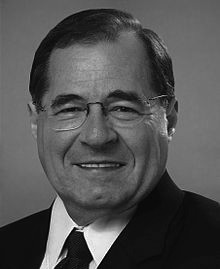
Congressman Jerrold Nadler (D-NY).
Since 911, the Bush administration asserted the state secrets privilege to dismiss civil cases involving the war on terror that challenged the legality of the executive branch’s conduct. The executive branch used the privilege to dismiss cases involving “extraordinary rendition” of suspects kidnapped and sent to prisons in countries that engage in torture. The government also used the privilege to dismiss NSA’s warrantless wiretapping program. The privilege ended the plaintiff’s assertion that the administration’s actions violated their individual constitutional civil rights. Since 2001 the privilege has been invoked in over fifty cases. The court rejected use of the privilege in only four of those cases.
The Supreme Court has concluded that, although the executive branch and the CIA may have better expertise in intelligence and national security matters, the judicial branch is not unequipped to handle cases that involve secrecy.
The court stated:
“We cannot accept the Government’s argument that internal security matters are too subtle and complex for judicial evaluation. Courts regularly deal with the most difficult issues of our society. There is no reason to believe that federal judges will be insensitive to or uncomprehending of the issues involved in domestic security cases”
(United States v. US Dist. Court (Keith), 407 US 297, 320 (1972)).
Original Intent of the State Secrets Privilege
Review of “US vs. Reynolds” reveals the Supreme Court mandated caution that the state secrets privilege not be invoked lightly. It was clear the privilege was to be used to protect only “the most sensitive military and national security information”—something every American would agree with. In addition, even if legitimate national security information is involved, US vs. Reynolds allows the case to proceed, while protecting this information, thus upholding the plaintiff’s basic constitutional rights.
Unfortunately the courts shrank from challenging Tenet’s regular assertion of the privilege. The chilling effect was the denial of plaintiff’s day in court under Article III of the Constitution. This allows the CIA to engage in illegal and discriminatory practices with absolute immunity. The CIA has exempted itself from the Constitution. This should cause a national outrage and a demand by the American people to hold the Agency accountable for its actions.
On August 14, 2007, the American Bar Association’s (ABA) 546-member House of Delegates voted to urge Congress to override the Bush administration order authorizing the CIA to use interrogation techniques such as water-boarding. The ABA also called on Congress to give federal judges more oversight over use of the “state secrets” doctrine to throw out legal challenges to the government’s anti-terrorism programs. The ABA resolution urges Congress “to provide a full and complete explanation of its privilege claim.” The ABA made the clear historical observation that, when government agencies surreptitiously bypass the judicial system and decide on their own to surveil citizens and invade their homes, abuse has occurred. The ABA resolution demands that judicial scrutiny of the invocation of the privilege be required, as it was not in “US vs. Reynolds.” In reality, the Reynolds decision was founded on a lie by the government that took place over fifty years ago. There was no information so sensitive that the constitutional rights of the widows of the four men on board should have been taken away.
A proposed bill, the State Secrets Protection Act, sponsored by Senators Edward Kennedy (D-MA, now deceased) and Arlen Specter (D-PA) provided for the appropriate protection of secrets while allowing the litigation to continue. The act allowed litigation to proceed, using safeguards that have been successful in criminal cases and litigation involving the Freedom of Information Act. The act clarified that the courts, not the executive branch, have the legal responsibility to review the evidence and determine whether or not the information is covered under the state secrets privilege.
In a March 31, 2008 letter to Senator Patrick Leahy, Chairman of the Senate Judiciary Committee, Attorney General Michael Mukasey expressed strong executive branch opposition to this pending legislation. Mukasey’s objections were rebutted by Dr. Louis Fisher, Library of Congress constitutional law expert. In his letter, to Mukasey, Dr. Fisher correctly wrote, “According to Mukasey, presidents are entitled to unilaterally define the scope of their powers under Article II and no other branch [of government] has any authority to impose limitations…” Most importantly, Fisher pointed out “The Constitution has been interpreted in that manner at times by some presidents, but never successfully. Such a reading would eliminate the checks and balances fundamental to the US Constitution.”
It is incredible that the Executive Branch, and especially the CIA, would have the nerve to even attempt such a significant violation of the US Constitution.
The CIA has routinely trumpeted its obligation to protect “sources and methods” as a reason for overriding the US Constitution, without having to justify the existence of true sources and methods—that is, information that would expose US intelligence procedures or risk the lives of intelligence officers and foreign assets. The Agency has used this term as a kind of carte blanche tool to silence any scrutiny of its use or misuse of the state secrets privilege. This is akin to a corrupt policeman announcing, “Stand back, I am a law enforcement officer,” as he plunders a convenience store.
During a July 18, 2001, Joint Hearing of the House of Representatives regarding the CIA’s refusal to cooperate with Congressional inquiries, Senator Steven Horn of California stated, “James Madison once wrote, ‘A popular government without popular information or the means of acquiring it is but a prologue to a farce or a tragedy or perhaps both.’ Madison was correct in his belief that the government’s ability to gather and provide reliable information to its people is vital to the health and well-being of our nation. Today’s hearing should not be necessary. However, it is taking place because the Central Intelligence Agency has refused to comply with the oversight efforts of the Committee on Government Reform and its several subcommittees. In so doing, the agency is assaulting Congress’ constitutional responsibility to oversee executive branch activities. The CIA apparently believes it is above that basic principle in our Constitution. We don’t agree. This hearing stems from a recent and contemptuous act by the Central Intelligence Agency during the Subcommittee on Government Efficiency, Financial Management and Intergovernmental Relations examination of security plans and policies to protect the government’s classified computer systems……Every federal agency except the Central Intelligence Agency responded to the survey.”
After refusing and being challenged, the CIA agreed to the subcommittee’s offer to discuss the information in a classified executive session, then days before the session was to occur the CIA advised the subcommittee it would not be participating regardless of a closed-door session. The CIA cited its obligation to protect “sources and methods,” as the reason for its refusal to answer Congress’ demands, although the subcommittee had made it clear it was not interested in examining sources and methods.
Senator Horn went on to say, “It is important that we protect the freedom and openness of our nation, symbolically and literally as the leader of the Free World. That kind of responsibility requires accountability, largely achieved through checks and balances of our three distinct and sometimes competing branches of government.” Horn continued, “CIA refuses to discuss its approaches to government wide management reforms and fiscal accountability practices. Other intelligence agencies share information freely….The source of all CIA funding is the American taxpayer and the methods of management efficiency and accountability must be within the purview of this and other committees of Congress.”
As noted in Chapter 16, “Countering Terror,” as part of the 9/11 Commission’s investigation into the World Trade Center attacks, the FBI, DOD and DOS declassified their reports for review by the panel and the American public. The CIA refused to declassify its report delineating failures leading up to 9/11. The need for review of information that led to the attack was critical in preventing it from ever happening again. To the CIA, the future protection of American citizens did not seem to matter. What mattered most to the CIA was, once again, covering the organization’s negligence under the guise of unnamed “sources and methods” and the use of “secrecy,” even if it was unconstitutional.
The importance of the ABA’s resolution, proposed legislation by Kennedy and Specter, Nadler’s proposal of the State Secrets Protection Act, President Obama’s and Attorney General Holder’s goal of reform, and Congressional outrage over the CIA withholding information from the legislative branch cannot be overstated. For decades the CIA has violated the US Constitution and the rights of countless US citizens with impunity. Year by year the CIA has transformed itself into a fenced organization that thumbs its nose at Congress, law enforcement agencies engaging in investigations, the US Constitution and the American people.
The concern of members of the Truman administration during the creation of the CIA in 1947 was that an agency, with that kind of power, could wind up becoming an unconstitutional Gestapo-like organization; untouchable by the constitution’s balance of powers. Today, the CIA has sealed off its management and financial practices from the legislative branch and the American taxpayer, and uses the states secrets privilege to manipulate the judicial branch of government.
It appears the concerns held by those in the Truman administration have become a reality. It also appears the Constitutional balance of powers between the Executive, Legislative and Judicial branches of the American government have been damaged.
The State Secrets Privilege and American Citizens
The essence of deception is the creation of an issue consisting of ninety percent truth and ten percent lie. The lie is so embedded in the truth it is missed by the beholder. But, the lie changes the entire meaning of the subject, usually in a nefarious direction. This is true regarding the state secrets privilege. Most Americans are led to believe the state secrets privilege is used only against terrorism suspects attempting to sue the US government over rendition, illegal detention or warrantless wiretapping. This is because these are usually the only cases making it into public view. The privilege is touted as the way to protect important government counter terrorism operations and procedures, and stop terrorists and their attorneys from misusing the legal system. Illegal rendition, detention and warrantless wiretapping are significant Constitutional issues. Many just shrug them off as part of the war on terror, not affecting the lives of the average American. It is of paramount importance to realize they affect the very fabric of our Constitutional freedoms. These freedoms are the only protection Americans have against government intrusion into the sanctum of privacy. When the government begins to erode these freedoms in any way, touting this as a patriotic protection, government power grows and the rights of the people decrease. This is the very nature of government. Government tyranny always begins with a claim it is increasing its size and power to protect “national security,” mixing a large truth with a small, powerful lie. This is particularly difficult to detect when things are done in secret.
Cases involving US citizens have been automatically dismissed using the state secrets privilege; then sealed in federal court. In these cases the plaintiffs, e.g., those suing the government for negligence or personal injury are referred to as “John Doe, et al.” If the case involves an American family whose father works in a classified position they are referred to as the “Doe Family.” Names are given to family members such as “John Doexxxxxxxxxxxxxxxxxxxxxxxxxxxxxxxxxxxxxxxxxxxxxxxxxxxxxxxxxxxxxxxxxxxxxxxxxxxxxxxxxxxxxxxxxxxxxxxxxxxxxxxxxxxxxxxxxxxxxxxxxxxxxxxxxxxxxxxxxxxxxxxxxxxxxxxxxxxxxxxxxxxxxxxx Once the state secrets privilege is invoked, automatically and without the court examining the evidence, the executive branch will move to have the case sealed. The courts automatically comply, essentially making themselves an arm of the executive branch. Following dismissal of the case using the privilege and the seal being added, xxxxxxxxx identity and the details of xxxx lawsuit will never be known. xxxxx plight is permanently placed in the shadows.

xxxxxxxxxxxxxxxxxxx identities and case facts are hidden in secret.
We all want to stop the war on terror. We all want terrorists brought to justice and terrorism neutralized. But, we must constantly monitor government’s increase in power and make sure it does not use the war on terror to take away our freedoms. If it does, we will lose the war on terror also, giving up the very freedoms terrorist organizations seek to destroy.
Unknown Use of the State Secrets Privilege
It is critical that Americans understand how current use of the state secrets privilege affects their rights personally. Unknown to most of us, the privilege has been used hundreds of times - against American citizens. This does not include the cases which have been sealed - and remain unknown. It is especially true regarding the government’s use of the privilege from 2001 until now.
Tens of thousands of Americans work for private government contractors, both large and small. Executive Order 10865 provides for the classification of several corporate activities involved in soliciting or winning government business. This includes bidding on contracts, contract awards, negotiations, contract performance and contract terminations. Because the information corporate personnel access as part of their normal duties is now classified, thousands of citizens fall under government secrecy laws or must sign a government secrecy agreement to continue their jobs; not knowing their rights have been taken away. The federal government established the National Industrial Security Program (NISP) to protect information disseminated to private contractors. This allowed government control of information, and those with access to it, routinely used by US corporations, small businesses and private citizens, and ushered in the use of the state secrets privilege in private industry, against American citizens. The Constitutional importance of this cannot be overstated.
In October 2011, the intelligence community report to congress revealed that 4.8 million US citizens hold security clearances for access to classified information. Each of these citizens is required to sign a government secrecy agreement, placing them under the shadow of the state secrets privilege.
US corporations with government contracts or access to government information now invoke the state secrets privilege against their own employees when lawsuits are brought against them. These lawsuits include assault, battery, racial discrimination, fraud, breach of contract, libel, patent infringement, toxic exposure, negligence and personal injury. Once the corporation claims the privilege to suppress evidence or request dismissal of the case, the government makes the decision whether or not the privilege applies. If the suit affects the government, risks exposure of its information or could reveal government malfeasance, the privilege will be upheld. Government claims of the privilege on behalf of the corporation are almost never reversed. The federal district courts automatically uphold it with no review of the evidence and the appeals courts follow suit.
I cannot stress enough how critical this issue is. Use of the state secrets privilege against American citizens to conceal government or corporate negligence is one of the most egregious violations of our Constitution in the last fifty years.
As I wrote earlier, this all began with the crash of an Air Force B-29 Superfortress bomber over Waycross, Georgia, on October 6, 1948, which killed nine of the thirteen men aboard. As I learned later in the investigation, four men either jumped too low or their chutes fouled in the aircraft. Five others plummeted to their death. One of these men was Albert H. Payla, an RCA engineer. Albert Payla was seated in the cockpit of the plane, which was buried on impact. Since February, 2000 his daughter, Judith Payla Loether, has been engaging in a heroic fight to expose the fraud behind the creation of the state secrets privilege. Loether was able to locate the unclassified B-29 accident report detailing the B-29 crash - on the Internet. This report was the central document used by the government to officially recognize the state secrets privilege, and deny the widows of the RCA engineers their rights.
In Unites States v. Reynolds, the district court and the Third Circuit upheld the widow’s constitutional rights and ruled in their favor because of the government’s refusal to release the Air Force report, allowing for just and fair proceedings to continue. This was, without a doubt, the constitutional approach. Supreme Court Chief Justice Vinson chose not to do so. Using his own definition of the scope of individual rights and basing his decision on an Air Force claim that was a fraud, i.e., the accident report was secret when in reality was not, Vinson created a new constitutional doctrine based on his own tangled reasoning - and expanded the power of the executive branch to resemble that of a monarchy.
On February 26, 2003, lawyers Wilson Brown and Jeff Almeida, representing several families who lost fathers, and in one case a husband, in the crash of the B-29, filed a petition with the Supreme Court requesting it reconsider its landmark 1953 decision in US v. Reynolds.
Referring to the Air Force accident report, the lawyers wrote, “Indeed they are no more than accounts of a flight that, due to the Air Force’s negligence, went tragically awry. In telling the Court otherwise, the Air Force lied. In reliance upon that lie, the Court deprived the widows [the three original plaintiffs] of their judgments. It is for this Court, through issuance of a writ of error coram nobis and in exercise of its inherent power to remedy fraud, to put things right… United States v. Reynolds stands as a classic ‘fraud on the court,’ one that is most remarkable because it succeeded in tainting a decision of our nation’s highest tribunal.”
On June 23, 2003, in a shocking decision, the Supreme Court refused to hear the petition to reopen the 1953 US v Reynolds case, despite its basis on fraud. It issued a one-sentence ruling:
“The motion for leave to file a writ of error coram nobis is denied.”
This decision occurred within the same time period, 2001 - 2009, that the Bush administration and the CIA used the state secrets privilege to shut down lawsuits, brought by US citizens, against the executive branch - more than any other time in US history. It unilaterally upset the Constitutional balance of powers, making the judiciary an arm of the executive branch; and gave the executive branch unbridled power to silence lawsuits against it.

Judith Palya Loether. Fought a heroic battle to expose the fraud behind creation of the state secrets privilege.
(Photo courtesy of Judith Palya Loether)
While writing this chapter I interviewed Judith Palya Loether regarding her story. Judy is an American who has felt the shock and pain of the state secrets privilege being used to cover up the truth, at the expense of her mother, three grieving widows and five little children. She made the following statement:
“I grew up understanding that my father had been killed in a B-29 when I was seven weeks old, leaving my mother with three small children. He had been testing secret equipment that he developed for the government as a civilian contractor. I understood that my mother had been involved a lawsuit because of the crash and I knew she had won some money as a result of that lawsuit.
More than 50 years after my father’s death, and with a lot of research, I finally came to know exactly what happened. I learned what my father saw and heard during his last minutes alive. I saw where his body came to rest and read about what it looked like. I read about the pilot turning off engine number 4 instead of the burning engine number 1. The engineer cut the fuel to engine number 2 instead of engine number 1. The mechanics had not installed heat shields as directed, and the plane needed special permission to fly that day because of its mechanical problems. The crew had not flown together before and the civilians had not been instructed how to get out of the plane in an emergency. But more shocking, and far more disturbing, I also learned what my America did to my mother in the Supreme Court of the United States so that the executive branch of the government could have a privilege.
I came to understand that my mother had not won her case, she had lost it, and it was a case that had gone all the way to the Supreme Court. The widows had won in the Federal Court and in the Federal Appellate Court. But the government chose to challenge the decision all the way to the Supreme Court, where the widows lost and received a settlement. In the now famous case US v Reynolds 345 US 1, the government told the Justices of the Supreme Court that the Air Force Accident Report, withheld from the Federal Court, revealed information about the secret equipment on the plane that was SO secret it would jeopardize national security if even a judge saw it. The Justices bought this lie and reversed the lower court decision in the favor of the government. I knew the government’s statement to be a lie. I HAD that now declassified report in its entirety and the ONLY mention of that secret equipment was just that . . . “the secret equipment was removed from the plane [wreckage].”
Later I learned how the government had a purpose in their appeals. It was not to save them the $250,000.00 judgment for the three widows and their attorneys. It was to get the State Secrets Privilege. Still today I visualize a government building conference room in around 1951, where some big wigs are deciding to get an Executive privilege into case law by lying in the Supreme Court. This was not some cement factory the government was plowing under, it was my mom, three grieving widows and five little children. Is this my America? Truth, Justice and the American Way? Harry Truman was President then. He had to know about this power play for the President of the Unites States and all those heads of departments under him. He was “the buck stops here” guy remember? You know, that’s all about taking responsibility.
I decided to sue the government. I wanted the People to know that the government lied, in the Supreme Court of the United States and did injury to my mother, me, my brothers and the other families with malice aforethought. I thought the Justices would be shocked. A small part of me thought that when the President heard about it he might call to apologize. Well, yeah, wasn’t I awfully naïve? I thought my country usually did the right thing, this is AMERICA. But in my journey I have come to understand so much. This country is NOT about Truth and Justice. This country is not about WE the People.”
Government bureaucracy always moves towards increase in power. Today, it is doing so using the state secrets privilege, with increasing frequency, to expand its control - and protect its own negligence. The founding fathers trumpeted the need to resist this inherent tendency of government, with eternal vigilance. Despite the fraud and unconstitutional ruling behind the creation of the state secrets privilege on March 9, 1953, dramatic abuse of the privilege continues today, routinely violating the rights of American citizens. As the saying goes, “Enough is enough.”
The time for reform of the state secrets privilege has come.
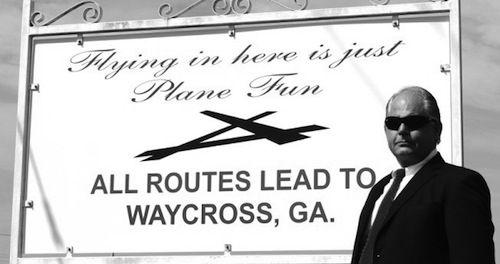
The Author in front of a sign that says it all. Government abuse of secrecy leads back to Waycross, Georgia in 1948. (Photo courtesy of the author)
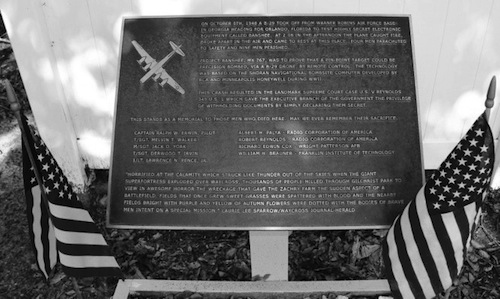
Plaque placed at the site of the B-29 crash by Judith Palya Loether, daughter of Albert H. Payla, an RCA engineer killed in the crash. The plaque and its location have remained largely unknown to most Americans. (Photo courtesy of the author)
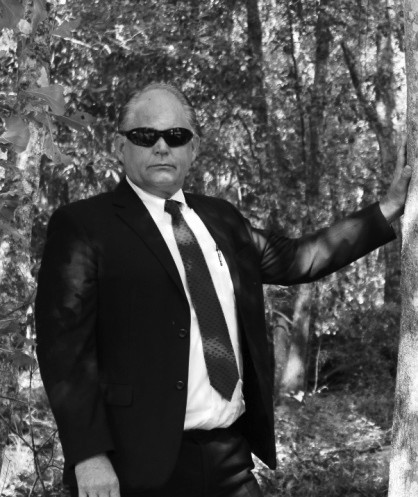
The Author at the site where the B-29 Superfortress went down. The site was previously farmland. (Photo courtesy of the author)
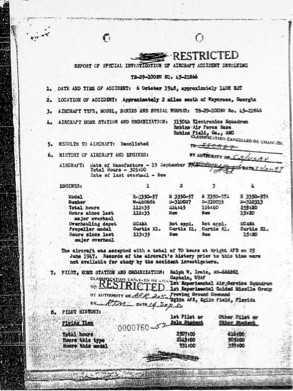
Copy of the Air Force's accident report. The Air Force originally claimed the document was classified. This was the basis of the Supreme Court decision United States v. Reynolds. Later it was determined there was no classified information in the document and the crash was the result of negligence. Despite the fact that the Supreme Court decision officially recognizing the state secrets privilege was based on fraud, the privilege remains today. Overt examination reveals it has been used approximately fifty times. In reality, the privilege has been used at least four hundred times. This does not include the number of cases that have been sealed; hidden from Congress and the public. (Photo courtesy of the Author).

Photo of the B-29 crash site in 1948.
(Photo courtesy of Judith Palya Loether)
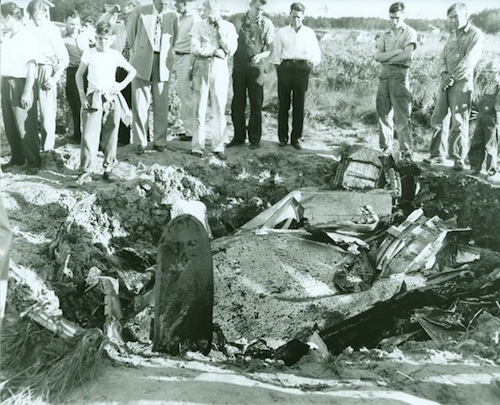
Photo of the cockpit’s point of impact, B-29 crash site in 1948.
(Photo courtesy of Judith Palya Loether)

Albert Palya, RCA engineer.
(Photo courtesy of Judith Palya)

Elizabeth Palya, Albert Palya’s widow, with her daughter Judith Alberta Palya, one month after the B-29 Crash.
(Photo courtesy of Judith Palya)